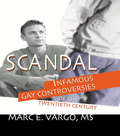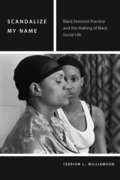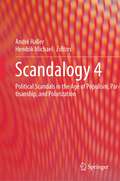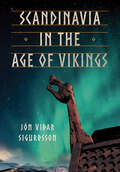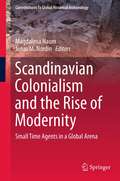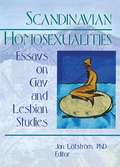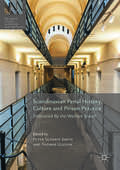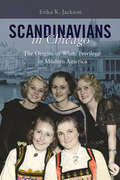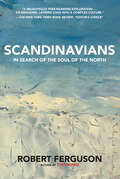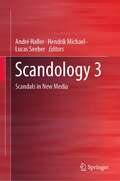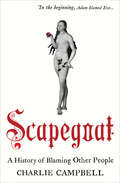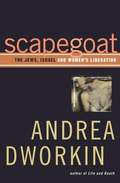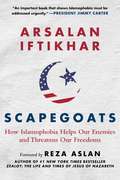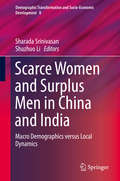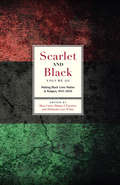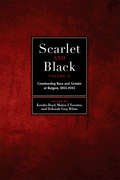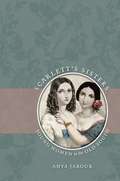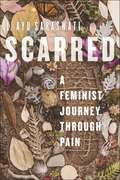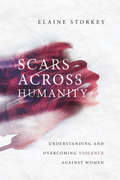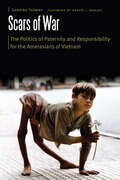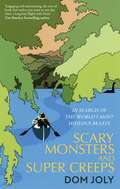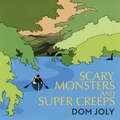- Table View
- List View
Scandal: Infamous Gay Controversies of the Twentieth Century
by Marc E VargoExamine the cornerstone incidents of modern gay political history!Scandal: Infamous Gay Controversies of the Twentieth Century is a compelling and thorough examination of same-sex controversies that range from accusations of obscenity and libel to espionage, treason, murder, and political dissent, with penalties that included censorship, imprisonment, deportation, and death. In each case, scandal brought the subject of homosexuality into public view in an explosive, sensational manner, stalling (and sometimes reversing) any progress made by the gay and lesbian community in mainstream society. Author Marc E. Vargo details the dignity, courage, and wisdom displayed by the gay men and women under attack in the face of public judgment.A unique blend of biography and gay political history, Scandal: Infamous Gay Controversies of the Twentieth Century recounts seven international incidents that tally the cost of being homosexual in a heterosexual society. In each episode, gay men or lesbians are targeted for legal persecution, subjected to sensationalized media coverage, and publicly condemned. The book examines the short- and long-term consequences of each controversy for those involved and the impact each scandal had on gay and mainstream society.Scandal: Infamous Gay Controversies of the Twentieth Century documents the stories of: Italian filmmaker Pier Paolo Pasolini--his 1975 murder and its subsequent cover-up British diplomats Guy Burgess and Donald Maclean--their defection to Russia at the height of the Cold War Cuban political dissident Reinaldo Arenas--his imprisonment in the 1960s that led to the exposure of the violent homophobia of the Castro regime Irish consul Roger Casement--his execution on treason charges and the later accusation that crucial evidence had been forged South African human rights activist Simon Nkoli--his persecution by his country's all-white, pro-apartheid government British writer Radclyffe Hall--the obscenity trial in the 1920s surrounding her novel, The Well of Loneliness German emperor Kaiser Wilhelm II--the exposé of his relationship with Prince Eulenburg A scholarly work of historical significance, Scandal: Infamous Gay Controversies of the Twentieth Century is written in a straightforward tone that appeals to academics, students, and interested readers, gay or straight. The book stands alone as a record of the role played by public opinion in modern gay history.
Scandalize My Name: Black Feminist Practice and the Making of Black Social Life (Commonalities)
by Terrion L. WilliamsonFrom sapphire, mammy, and jezebel, to the angry black woman, baby mama, and nappy-headed ho, black female iconography has had a long and tortured history in public culture. The telling of this history has long occupied the work of black female theorists—much of which has been foundational in situating black women within the matrix of sociopolitical thought and practice in the United States. Scandalize My Name builds upon the rich tradition of this work while approaching the study of black female representation as an opening onto a critical contemplation of the vagaries of black social life. It makes a case for a radical black subject-position that structures and is structured by an intramural social order that revels in the underside of the stereotype and ultimately destabilizes the very notion of “civil society.”At turns memoir, sociological inquiry, literary analysis, and cultural critique, Scandalize My Name explores topics as varied as serial murder, reality television, Christian evangelism, teenage pregnancy, and the work of Toni Morrison to advance black feminist practice as a mode through which black sociality is both theorized and made material.
Scandalogy 4: Political Scandals in the Age of Populism, Partisanship, and Polarization
by André Haller Hendrik MichaelThis volume examines the growing presence of populism, partisanship, and polarization and analyzes what this means for scandalization processes. While politics appears to have entered a mode of perpetual crisis and growing dysfunctionality, the rapid succession of scandals may be a symptom of this crisis and its catalyst at the same time. The book provides a better definition of political scandals and discusses from an interdisciplinary and critical scientific perspective how such scandals are relevant to political developments and how they impact public discourse and media practices. International experts from various subfields of communication studies, political communication research as well as related disciplines contribute to the volume with conceptual, empirical, and methodological approaches which reflect on political scandals and the role of media and/or communication. Presenting a unique perspective and providing a first in-depth insight into the relationship between polarization, partisanship, populist communication, and scandalization, the book will appeal to students, researchers, and scholars from different disciplines, as well as practitioners and policy-makers interested in a better understanding of political scandals, their impact on public discourse and political developments, and their catalyzation through media and communication.
Scandals of Classic Hollywood
by Anne Helen PetersenGossip meets history--a compulsively readable collection of Hollywood's most notorious clashes and controversies in the spirit of Hollywood Babylon Believe it or not, America's fascination with celebrity culture was thriving well before the days of TMZ, Perez Hilton, Charlie Sheen's breakdown and allegations against Woody Allen. And the stars of yesteryear? They weren't always the saints that we make them out to be. Film professor Anne Helen Petersen is here to set the record straight with Scandals of Classic Hollywood. Pulling little-known gems from the archives of film history, Petersen reveals eyebrow-raising information, including: The smear campaign against the original It Girl, Clara Bow, started by her best friend The heartbreaking story of Montgomery Clift's rapid rise to fame, the car accident that destroyed his face, and the "long suicide" that followed Fatty Arbuckle's descent from Hollywood royalty, fueled by allegations of a boozy orgy turned violent assault Why Mae West was arrested and jailed for "indecency charges" And much more Part biography, part cultural history, these stories cover the stuff that films are made of: love, sex, drugs, illegitimate children, illicit affairs, and botched cover-ups. But it's not all just tawdry gossip in the pages of this book. The stories are all contextualized within the boundaries of film, cultural, political, and gender history, making for a read that will inform as it entertains. Based on Petersen's popular column on the Hairpin, but featuring 100% new content, Scandals of Classic Hollywood is sensationalism made smart.
Scandinavia in the Age of Vikings
by Jon Vidar SigurdssonIn Scandinavia in the Age of Vikings, Jón Viðar Sigurðsson returns to the Viking homeland, Scandinavia, highlighting such key aspects of Viking life as power and politics, social and kinship networks, gifts and feasting, religious beliefs, women's roles, social classes, and the Viking economy, which included farming, iron mining and metalworking, and trade.Drawing of the latest archeological research and on literary sources, namely the sagas, Sigurðsson depicts a complex and surprisingly peaceful society that belies the popular image of Norsemen as bloodthirsty barbarians. Instead, Vikings often acted out power struggles symbolically, with local chieftains competing with each other through displays of wealth in the form of great feasts and gifts, rather than arms. At home, conspicuous consumption was a Viking leader's most important virtue; the brutality associated with them was largely wreaked abroad.Sigurðsson's engaging history of the Vikings at home begins by highlighting political developments in the region, detailing how Danish kings assumed ascendency over the region and the ways in which Viking friendship reinforced regional peace. Scandinavia in the Age of Vikings then discusses the importance of religion, first pagan and (beginning around 1000 A.D.) Christianity; the central role that women played in politics and war; and how the enormous wealth brought back to Scandinavia affected the social fabric—shedding new light on Viking society.
Scandinavian Colonialism and the Rise of Modernity
by Magdalena Naum Jonas M. NordinIn Scandinavian Colonialism and the Rise of Modernity: Small Time Agents in a Global Arena, archaeologists, anthropologists, and historians present case studies that focus on the scope and impact of Scandinavian colonial expansion in the North, Africa, Asia and America as well as within Scandinavia itsself. They discuss early modern thinking and theories made valid and developed in early modern Scandinavia that justified and propagated participation in colonial expansion. The volume demonstrates a broad and comprehensive spectrum of archaeological, anthropological and historical research, which engages with a variation of themes relevant for the understanding of Danish and Swedish colonial history from the early 17th century until today. The aim is to add to the on-going global debates on the context of the rise of the modern society and to revitalize the field of early modern studies in Scandinavia, where methodological nationalism still determines many archaeological and historical studies. Through their theoretical commitment, critical outlook and application of postcolonial theories the contributors to this book shed a new light on the processes of establishing and maintaining colonial rule, hybridization and creolization in the sphere of material culture, politics of resistance, and responses to the colonial claims. This volume is a fantastic resource for graduate students and researchers in historical archaeology, Scandinavia, early modern history and anthropology of colonialism
Scandinavian Homosexualities: Essays on Gay and Lesbian Studies
by Jan LeofstreomScandinavian Homosexualities offers non-Scandinavian readers a rare opportunity to explore the history, sociology, notions, experiences, and cultural politics of homosexuality in Scandinavian societies in English. This unique insight into some of the most advanced countries in regard to institutionalized civil rights for lesbians and gays will help you direct change and progress in your own country.Chapters in Scandinavian Homosexualities draw from a range of theoretical and methodological strands to give you an overall picture of homosexuality in Scandinavian society. They cover a wide range of issues, including: traditions and practices in the legal regulation of same-sex sexuality the historically changing understanding of femininity and masculinity physical, social, and cultural niches of same-sex desire and sexual conduct theoretical approaches to individual experiences of sexual and erotic selfIn Scandinavian Homosexualities, you’ll come to see the cultural and social differences that exist between Scandinavian and Anglo-American societies. Specifically, you’ll see how differences in the culture of gender and sexuality may bear upon our scholarly theories and conceptualizations of homosexuality and on our analysis of sexual and gender politics. In many of the chapters there is, thus, an agenda to encourage comparisons among Western societies.The Scandinavian countries are among the most advanced in the world with regard to institutionalized civil rights of lesbians and gays. They are also, which is relevant for analyses of sexuality and homosexuality, societies where men and women are exceptionally equal in access to social, economic, and cultural resources. You can directly apply what you learn in Scandinavian Homosexualities of the cultural specificities of gender and sexuality in Scandinavian societies to your efforts to establish equality for same-sex relationships within your own culture.
Scandinavian Penal History, Culture and Prison Practice
by Peter Scharff Smith Thomas UgelvikThis book draws on historical and cross-disciplinary studies to critically examine penal practices in Scandinavia. The Nordic countries are often hailed by international observers as 'model societies', with egalitarian welfare policies, low rates of poverty, humane social policies and human rights oriented internal agendas. This book, however, paints a much more nuanced picture of the welfare policies, ideologies and social control in strong centralistic states. Based on extensive new empirical data, leading Nordic and international scholars discuss the relationship between prison conditions in Scandinavia and Scandinavian social policy more generally, and argue that it is not always liberating and constructive to be embraced by a powerful welfare state. This book is essential reading for researchers of state punishment in Scandinavia, and it is highly relevant for anyone interested in the 'Nordic Model' of social policy.
Scandinavians in Chicago: The Origins of White Privilege in Modern America
by Erika K. JacksonScandinavian immigrants encountered a strange paradox in 1890s Chicago. Though undoubtedly foreign, these newcomers were seen as Nordics--the "race" proclaimed by the scientific racism of the era as the very embodiment of white superiority. As such, Scandinavians from the beginning enjoyed racial privilege and the success it brought without the prejudice, nativism, and stereotyping endured by other immigrant groups. Erika K. Jackson examines how native-born Chicagoans used ideological and gendered concepts of Nordic whiteness and Scandinavian ethnicity to construct social hegemony. Placing the Scandinavian-American experience within the context of historical whiteness, Jackson delves into the processes that created the Nordic ideal. She also details how the city's Scandinavian immigrants repeated and mirrored the racial and ethnic perceptions disseminated by American media. An insightful look at the immigrant experience in reverse, Scandinavians in Chicago bridges a gap in our understanding of how whites constructed racial identity in America.
Scandinavians: In Search of the Soul of the North
by Robert Ferguson“An engaging, layered look into a culture complex enough both to produce stylish rain gear and to embrace the foul weather that necessitates it.” —The New York Times Book ReviewWe fill our homes with Nordic furniture; we envy their humane social welfare system and healthy outdoor lifestyle; we devour their crime fiction. Even their strangely attractive melancholia seems to express a stoic, commonsensical acceptance of life’s vicissitudes. But how valid is this outsider’s view of Scandinavia, and how accurate is our picture of life in Scandinavia today? Scandinavians follows a chronological progression across the Northern centuries: the Vendel era of Swedish prehistory; the age of the Vikings; the Christian conversions of Denmark, Norway, Sweden and Iceland; the unified Scandinavian state of the late Middle Ages; the sea-change of the Reformation; the kingdom of Denmark-Norway; King Gustav Adolphus and the age of Sweden’s greatness; the cultural golden age of Ibsen, Strindberg, and Munch; the impact of the Second World War; Scandinavia’s postwar social democratic nirvana; and the terror attack of Anders Behring Breivik. Scandinavians is also a personal investigation, with award-winning author Robert Ferguson as the ideal companion as he explores not only the region’s society, politics, culture, and temperament, but also wide-ranging topics such as the power and mystique of Scandinavian women, from the Valkyries to the Vikings; from Nora and Hedda to Garbo and Bergman. “A delightful history in which the author truly captures ‘the soul of the North.’ ”—Kirkus Reviews
Scandology 3: Scandals in New Media
by André Haller Hendrik Michael Lucas SeeberThis book presents research on mediated scandals and substantiates the understanding of such forms of scandals and their impact on societies. Additionally, it connects the study of scandals with the broader fields of political communication research, organizational communication, journalism studies, and digital communication research.The authors focus on the 21st century as an age of perpetual scandalization and on digital technologies as a catalyst in this respect. Against this backdrop, the book examines different aspects of the transformation of mediated scandals through digital communication practices.Topics covered include, but are not limited to, the scandalizing potential of new media and the requirement of modified strategies of reputation management and crisis communication in politics, the entertainment industry, and the economic system among others; a different perspective on professional journalism and scandals created through new media; technological infrastructure and digital tools allowing journalists to establish new means to investigate hard scandals, i.e., substantial financial or political wrongdoings by the economic and political elite.The book, therefore, is a must-read for researchers and scholars from different disciplines, as well as practitioners and policy-makers interested in a better understanding of the study of scandals, their impact on societies, and their catalyzation through new media.
Scapegoat: A History of Blaming Other People
by Charlie CampbellA &“brief and vital account&” of humanity&’s long history of playing the blame game, from Adam and Eve to modern politics—&“a relevant and timely subject&” (The Daily Telegraph). We may have come a long way from the days when a goat was symbolically saddled with all the iniquities of the children of Israel and driven into the wilderness, but has our desperate need to absolve ourselves by pinning the blame on someone else really changed all that much? Charlie Campbell highlights the plight of all those others who have found themselves in the wrong place at the wrong time, illustrating how God needs the Devil as Sherlock Holmes needs Professor Moriarty or James Bond needs &“Goldfinger.&” Scapegoat is a tale of human foolishness that exposes the anger and irrationality of blame-mongering while reminding readers of their own capacity for it. From medieval witch burning to reality TV, this is a brilliantly relevant and timely social history that looks at the obsession, mania, persecution, and injustice of scapegoating. &“A wry, entertaining study of the history of blame . . . Trenchantly sardonic.&” —Kirkus Reviews
Scapegoat: The Jews, Israel, and Women's Liberation
by Andrea DworkinThe author writes about her views on male chauvinism, anti-Jewish attitudes, and the remedial measures to combat the problems faced by women and Jews.
Scapegoats: How Islamophobia Helps Our Enemies and Threatens Our Freedoms
by Reza Aslan Arsalan IftikharWhen a murderous psychopath goes on a killing spree, law enforcement officials and the media never make his religion the central issue?unless he happens to be a Muslim. Then it sets off another frenzied wave of commentary about the inherent evils that lurk within the Muslim faith. From Fox News talking heads, who regularly smear Muslim leaders as secret terrorists, to Bill Maher, who has made Islam a routine target, it has become widely acceptable to libel a religion with a following of over 1.5 billion people?nearly one-quarter of the world’s population. Now popular commentator Arsalan Iftikhar?better known as ?The Muslim Guy”?offers a spirited defense of his faith that is certain to win him wide acclaim?and yes, another round of overheated scolding from the usual media quarters. Iftikahr’s spirited defense of his faith is certain to hit a chord during the 2016 campaign season, as politicians and pundits vie to be the toughest on the block when it comes to escalating the hostilities in the Middle East, often demonizing Islam in the process. With his witty and levelheaded demeanor, the author will cut through all the sound and fury as a voice of sanity and reason.
Scarce Women and Surplus Men in China and India
by Sharada Srinivasan Shuzhuo LiThis volume documents how families, communities and some groups (single men, young 'scarce' women, parents) adapt and adjust to recent demographic shifts in China and India. It discusses how demographic change interacts with other processes of change, including changes with respect to economic development and globalization, gender, class, caste, families, migration and work. The chapters offer micro-level analyses contextualized in larger processes of change and push further existing understandings of the consequences of the demographic imbalance between men and women in China and/or India, particularly from a gender perspective. As such this book will be of interest to scholars and students in population studies, sociology, international development, gender studies, and Asian studies.
Scarlet and Black, Volume Three: Making Black Lives Matter at Rutgers, 1945-2020
by Edward White Joseph Williams Beatrice J. Adams Tracey Johnson Pamela N. Walker Meagan Wierda Roberto C. Orozco Carie Rael Brooke A. Thomas Ian Gavigan Kaisha Esty Whitney Fields Jesse Bayker Kenneth Morrissey Joseph Kaplan Lynda DexheimerThe 250th anniversary of the founding of Rutgers University is a perfect moment for the Rutgers community to reconcile its past, and acknowledge its role in the enslavement and debasement of African Americans and the disfranchisement and elimination of Native American people and culture. Scarlet and Black, Volume Three, concludes this groundbreaking documentation of the history of Rutgers’s connection to slavery, which was neither casual nor accidental—nor unusual. Like most early American colleges, Rutgers depended on slaves to build its campuses and serve its students and faculty; it depended on the sale of black people to fund its very existence. This final of three volumes concludes the work of the Committee on Enslaved and Disenfranchised Population in Rutgers History. This latest volume includes essays about Black and Puerto Rican students' experiences; the development of the Black Unity League; the Conklin Hall takeover; the divestment movement against South African apartheid; anti-racism struggles during the 1990s; and the Don Imus controversy and the 2007 Scarlet Knights women's basketball team. To learn more about the work of the Committee on Enslaved and Disenfranchised Population in Rutgers History, visit the project's website at http://scarletandblack.rutgers.edu.
Scarlet and Black, Volume Two: Constructing Race and Gender at Rutgers, 1865-1945
by Joseph Williams Beatrice J. Adams Shauni Armstead Miya Carey Tracey Johnson Brenann Sutter Pamela N. Walker Meagan Wierda Caitlin Reed Wiesner Shari Cunningham Eri Kitada Jerrad P PacatteThe 250th anniversary of the founding of Rutgers University is a perfect moment for the Rutgers community to reconcile its past, and acknowledge its role in the enslavement and debasement of African Americans and the disfranchisement and elimination of Native American people and culture. Scarlet and Black, Volume 2, continues to document the history of Rutgers’s connection to slavery, which was neither casual nor accidental—nor unusual. Like most early American colleges, Rutgers depended on slaves to build its campuses and serve its students and faculty; it depended on the sale of black people to fund its very existence. This second of a planned three volumes continues the work of the Committee on Enslaved and Disenfranchised Population in Rutgers History. This latest volume includes: an introduction to the period studied (from the end of the Civil War through WWII) by Deborah Gray White; a study of the first black students at Rutgers and New Brunswick Theological Seminary; an analysis of African-American life in the City of New Brunswick during the period; and profiles of the earliest black women to matriculate at Douglass College. To learn more about the work of the Committee on Enslaved and Disenfranchised Population in Rutgers History, visit the project's website at http://scarletandblack.rutgers.edu
Scarlett's Sisters
by Anya JabourScarlett's Sisters explores the meaning of nineteenth-century southern womanhood from the vantage point of the celebrated fictional character's flesh-and-blood counterparts: young, elite, white women. Anya Jabour demonstrates that southern girls and young women faced a major turning point when the Civil War forced them to assume new roles and responsibilities as independent women. Examining the lives of more than 300 girls and women between ages fifteen and twenty-five, Jabour traces the socialization of southern white ladies from early adolescence through young adulthood. Amidst the upheaval of the Civil War, Jabour shows, elite young women, once reluctant to challenge white supremacy and male dominance, became more rebellious. They adopted the ideology of Confederate independence in shaping a new model of southern womanhood that eschewed dependence on slave labor and male guidance.By tracing the lives of young white women in a society in flux, Jabour reveals how the South's old social order was maintained and a new one created as southern girls and young women learned, questioned, and ultimately changed what it meant to be a southern lady.Scarlett's Sisters explores the meaning of nineteenth-century southern womanhood from the vantage point of the celebrated fictional character's flesh-and-blood counterparts: young, elite, white women. Anya Jabour demonstrates that southern girls and young women faced a major turning point when the Civil War forced them to assume new roles and responsibilities as independent women. Examining the lives of more than 300 girls and women between ages fifteen and twenty-five, Jabour traces the socialization of southern white ladies from early adolescence through young adulthood. By tracing the lives of these young women in a society in flux, Jabour reveals how the South's old social order was maintained and a new one created as southern girls and young women learned, questioned, and ultimately changed what it meant to be a southern lady.-->
Scarred: A Feminist Journey Through Pain
by L. Ayu SaraswatiPROSE Award Winner for Biography and AutobiographyNamed one of Library Journal's Best Books of 2023Winner, Next Generation Indie Book Awards - Women's NonfictionOffers thought-provoking theories and life-transforming ways to deal with painWhat can we ask of pain? How can we be more creative and courageous in carrying pain in our lives? In this genre-bending work that is equal parts memoir and scholarly criticism, L. Ayu Saraswati provides thought-provoking theories and life-transforming ways to understand pain, specifically in relation to feminism. Arguing that pain is not merely a state we are in, Scarred reframes pain as a “transnational feminist object,” something that we can carry across international borders. Drawing on her own experience traveling across twenty countries within just over a year, Saraswati aims to bring readers along on her journey so that they might ask themselves, “How can I live with pain differently?”By using pain as a lens of feminist analysis, Scarred allows us to chart how power produces and operates through pain, and how pain is embodied and embedded in relationships. Saraswati provides a heartfelt and engaging recount of her experiences while also pushing the boundaries of the respective fields her story engages with. She allows for renewed academic and personal insights to blossom by using a blend of transnational feminist theory, travel studies, and pain studies. Ultimately, Scarred invites us to reframe pain and ask how might we carry it in a more humane, life-sustaining, enchanting, and feminist way.
Scars Across Humanity: Understanding and Overcoming Violence Against Women
by Elaine StorkeyChristianity Today 2019 Book of the Year Award, Politics and Public Life Across the globe, acts of violence against women produce more deaths, disability, and mutilation than cancer, malaria, and traffic accidents combined. The truth is that violence on such a scale could not exist were it not structured in some way into the very fabric of societies and cultures themselves. It could not continue if it were not somehow supported by deep assumptions about the value of women, or some justification of the use of power. In many cultures such assumptions are reiterated every day in the absence of legal protection for women, or indifference toward issues of human rights. In Scars Across Humanity, Elaine Storkey offers a rigorously researched overview of this global pandemic. From female infanticide and child brides to domestic abuse, prostitution, rape, and honor killings, violence against women occurs at all stages of life, and in all cultures and societies. How and why has this violence become so prevalent? It seems ambitious to hope that we can find an answer to this question, but if violence to women is ever to be eliminated, we need to know what we are up against.
Scars Don't Hurt: A Story of Triumph Over Sexual Abuse
by Margaret Davidson Blake DavidsonFear gripped her and held her captive in a prison of traumatic gloom until she met someone who would change her life. Author Margaret Davidson reveals the secrets of her childhood and the key to liberty in her new release, Scars Don't Hurt.
Scars of War: The Politics of Paternity and Responsibility for the Amerasians of Vietnam (Borderlands and Transcultural Studies)
by Sabrina ThomasBest First Book Award from the History Honor Society, Phi Alpha ThetaScars of War examines the decisions of U.S. policymakers denying the Amerasians of Vietnam—the biracial sons and daughters of American fathers and Vietnamese mothers born during the Vietnam War—American citizenship. Focusing on the implications of the 1982 Amerasian Immigration Act and the 1987 Amerasian Homecoming Act, Sabrina Thomas investigates why policymakers deemed a population unfit for American citizenship, despite the fact that they had American fathers. Thomas argues that the exclusion of citizenship was a component of bigger issues confronting the Nixon, Ford, Carter, and Reagan administrations: international relationships in a Cold War era, America&’s defeat in the Vietnam War, and a history in the United States of racially restrictive immigration and citizenship policies against mixed-race persons and people of Asian descent. Now more politically relevant than ever, Scars of War explores ideas of race, nation, and gender in the aftermath of the Vietnam War. Thomas exposes the contradictory approach of policymakers unable to reconcile Amerasian biracialism with the U.S. Code. As they created an inclusionary discourse deeming Amerasians worthy of American action, guidance, and humanitarian aid, federal policymakers simultaneously initiated exclusionary policies that designated these people unfit for American citizenship.
Scary Monsters and Super Creeps: In Search of the World's Most Hideous Beasts
by Dom JolyDom Joly sets off round the world, but this time he's not looking to holiday in a danger zone - he's monster hunting. Ever since he was given a copy of Arthur C. Clarke's Mysterious World for his ninth birthday Dom has been obsessed with the world of cryptozoology - monster hunting - and in Scary Monsters and Super Creeps he heads to six completely different destinations to investigate local monster sightings. He explores the Redwood Curtain in northern California in search of Sasquatch; in Canada he visits Lake Okanagan hoping to catch a glimpse of a thirty-foot snake-like creature called Ogopogo; and near Lake Tele in Congo he risks his life tracking the vegetarian sauropod Mokele-mbembe. Naturally he heads to Loch Ness - but for this hunt he has his family in tow; he treks across the Khumbu Valley in Nepal looking for Yeti; and in the hills above Hiroshima in Japan he enlists the help of a local man to find the Hibagon, a terribly smelly 'caveman ape'. Are the monsters all the product of fevered minds, or is there a sliver of truth somewhere in the madness? Either way, the search gives Dom an excuse to dive into six fascinating destinations on a gloriously nutty adventure. In typically hilarious and irreverent fashion, Dom explores the cultures that gave rise to these monster myths and ends up in some pretty hairy situations with people even stranger than the monsters they are hunting.
Scary Monsters and Super Creeps: In Search of the World's Most Hideous Beasts
by Dom JolyDom Joly sets off round the world, but this time he's not looking to holiday in a danger zone - he's monster hunting. Ever since he was given a copy of Arthur C. Clarke's Mysterious World for his ninth birthday Dom has been obsessed with the world of cryptozoology - monster hunting - and in Scary Monsters and Super Creeps he heads to six completely different destinations to investigate local monster sightings. He explores the Redwood Curtain in northern California in search of Sasquatch; in Canada he visits Lake Okanagan hoping to catch a glimpse of a thirty-foot snake-like creature called Ogopogo; and near Lake Tele in Congo he risks his life tracking the vegetarian sauropod Mokele-mbembe. Naturally he heads to Loch Ness - but for this hunt he has his family in tow; he treks across the Khumbu Valley in Nepal looking for Yeti; and in the hills above Hiroshima in Japan he enlists the help of a local man to find the Hibagon, a terribly smelly 'caveman ape'. Are the monsters all the product of fevered minds, or is there a sliver of truth somewhere in the madness? Either way, the search gives Dom an excuse to dive into six fascinating destinations on a gloriously nutty adventure. In typically hilarious and irreverent fashion, Dom explores the cultures that gave rise to these monster myths and ends up in some pretty hairy situations with people even stranger than the monsters they are hunting.
Scary Monsters and Super Creeps: In Search of the World's Most Hideous Beasts
by Dom JolyDom Joly sets off round the world, but this time he's not looking to holiday in a danger zone - he's monster hunting. Ever since he was given a copy of Arthur C. Clarke's Mysterious World for his ninth birthday Dom has been obsessed with the world of cryptozoology - monster hunting - and in Scary Monsters and Super Creeps he heads to six completely different destinations to investigate local monster sightings. He explores the Redwood Curtain in northern California in search of Sasquatch; in Canada he visits Lake Okanagan hoping to catch a glimpse of a thirty-foot snake-like creature called Ogopogo; and near Lake Tele in Congo he risks his life tracking the vegetarian sauropod Mokele-mbembe. Naturally he heads to Loch Ness - but for this hunt he has his family in tow; he treks across the Khumbu Valley in Nepal looking for Yeti; and in the hills above Hiroshima in Japan he enlists the help of a local man to find the Hibagon, a terribly smelly 'caveman ape'. Are the monsters all the product of fevered minds, or is there a sliver of truth somewhere in the madness? Either way, the search gives Dom an excuse to dive into six fascinating destinations on a gloriously nutty adventure. In typically hilarious and irreverent fashion, Dom explores the cultures that gave rise to these monster myths and ends up in some pretty hairy situations with people even stranger than the monsters they are hunting.
